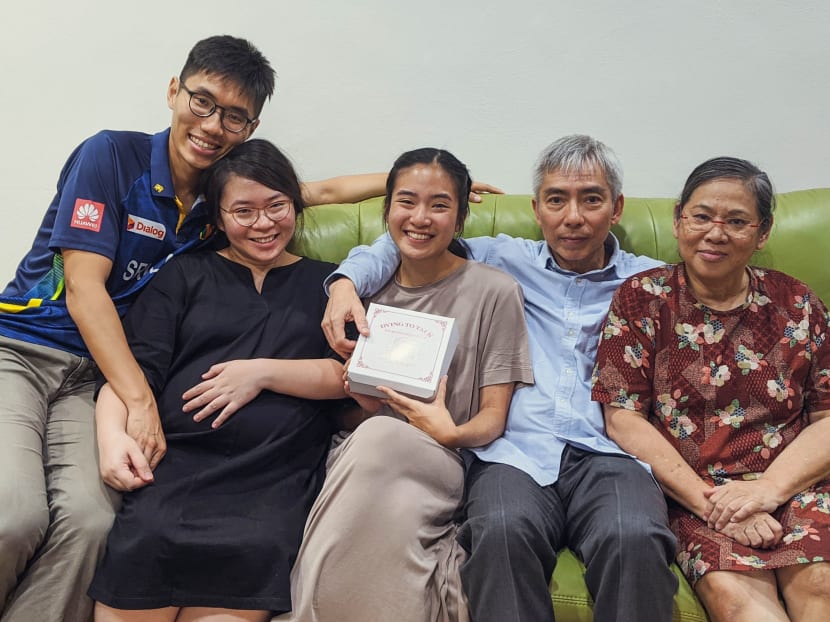Gen Y Speaks: My parents talk to me about their deaths. Yours should too.
Earlier this year, my parents had a “death talk” with me.

The author (centre) with her brother-in-law Alvin Tan, sister Yeo Tai Yi, mother Low Siew Luan and father
Yeo Gun Tong.
Earlier this year, my parents had a “death talk” with me.
They said they had already written their wills, explained their funeral preferences and added that they did not want to be put on life support in the final stages of a terminal illness.
I must admit I found the conversation unsettling. It felt like a reminder to myself of their impermanence, even though at 70 and 64, they are still relatively healthy.
To think of a life without those who brought me into this world made me emotional and uncomfortable.
I guess that’s because death has long been a taboo topic, leading to a “culture of silence” surrounding it. In most Asian families, any mention of death in a conversation brings about exclamations of “choy, choy, touch wood!” from the older generation.
Talking to our loved ones about their death smacks of being disrespectful and unfilial. However, I am glad my parents are not like this.
They also help me realise this: If death is inevitable, shouldn’t we be talking more about it?
A close friend of mine, Rachel (not her real name), told me about her recent experience with death when her grandmother passed away.
She saw her family being torn apart by differing opinions on how the family matriarch’s final send-off should be.
Rachel’s Taoist grandmother never expressed how she wanted her funeral to be like, and in a family of different faiths, the question arose: Who had the right to decide which was the “correct” funeral proceeding?
Her oldest uncle insisted that he made the decision because he was the oldest, and knew “ma” better than anyone else.
Her younger aunt argued that her word should be final, because she would be contributing the most money to the funeral, given that she was the wealthiest amongst the four children.
Such divisions within the family can reveal itself even in medical and legal decisions.
Without a properly documented will, the automatic distribution of assets to all surviving children seems to lack personal thought.
Without a documentation of a preferred medical treatment, the responsibility of deciding if one were to continue on life support or not would fall on the shoulders of the children.
Death can bring a family closer whilst celebrating a loved one’s legacy. However, when that death is surrounded by a culture of silence and uncertainty, the opposite is true.
Hearing Rachel’s story reminded me of how differently my family deals with death.
Besides writing their own will, my parents made their own Lasting Power of Attorney arrangements. They have explained to my sister and I their funeral plans and care options.
They told us they did so because they knew that the last thing they wished for was to burden us when they pass on. Being unsuperstitious, they both believe that it is better to make plans now rather than leave things unsaid.
For once in my life, I was thankful for my parents’ “kiasu” mentality.
It is reassuring, as their child, to know how to care for my parents in their final days, and to give them the send-off they want.
With clear communication and preparation, I will not be burdened with decision-making on my parents’ behalf or miscommunicating with my relatives on these affairs.
Most importantly, I will be able to focus on grieving properly and gaining closure by celebrating their legacy with love and appreciation, rather than confusion and apprehension upon their departures.
I’ve come to realise that filial piety does not mean tipping toes around a taboo topic, but is best expressed when we take on the responsibility to learn about our parents’ values and beliefs, and understand how that influences the decisions they make.
This is why I, alongside three schoolmates, are spearheading a digital campaign called “Dying To Talk”, adapted from the international initiative “Death Over Dinner” that aims to bring conversations about death and dying to the dinner table.
Through our campaign, we aim to encourage Singaporean families to kickstart one of life’s most important conversations, by empowering them with a simple conversation kit.
We hope that families would see that this conversation need not be dark or dreary, but can happen in everyday, casual settings, particularly during family mealtimes — which we depicted in a series of “Death Over Dinner” videos.
We have the responsibility as a younger generation to not let traditions and taboos get in the way of important conversations.
My friends often react with intrigue and admiration when they learn about my chats with my parents about death as this is not common in their household.
I am grateful to be in a family that emphasises clear and open communication about death, and I want to inspire other families to start this conversation as it has benefitted my family.
To all parents out there: We, your children, will be the ones caring for you as you age, and will eventually have to deal with the loss of your presence.
Our future selves will be grateful if you would take the first step to have this conversation with us.
Yes, death is "pantang" (Malay for taboo) in our culture. But having the conversation today also means a much lighter burden to bear in the future when death eventually hits home.
ABOUT THE AUTHOR:
Yeo Zhi Yi is a fourth-year student at Nanyang Technological University where she is currently pursuing her final semester in Communication Studies.









